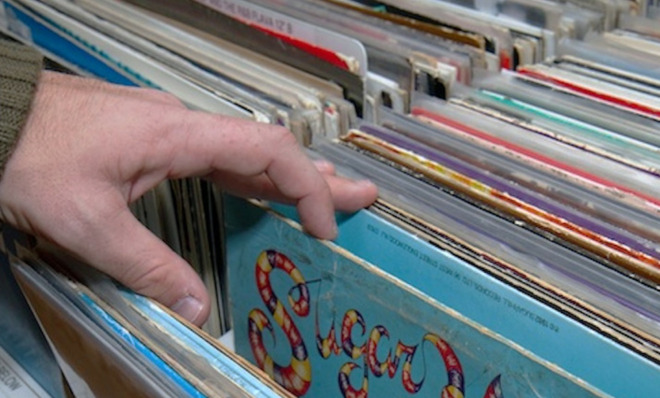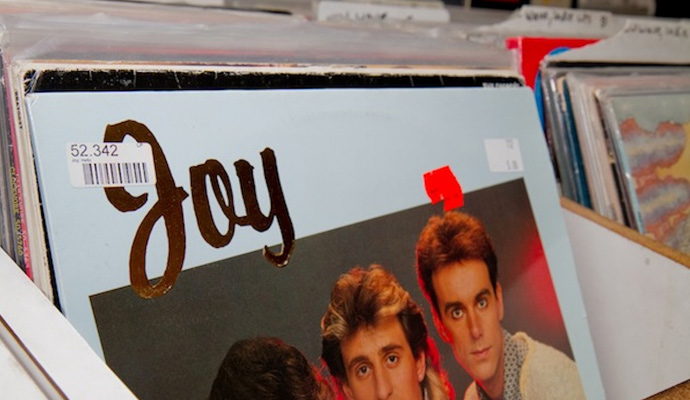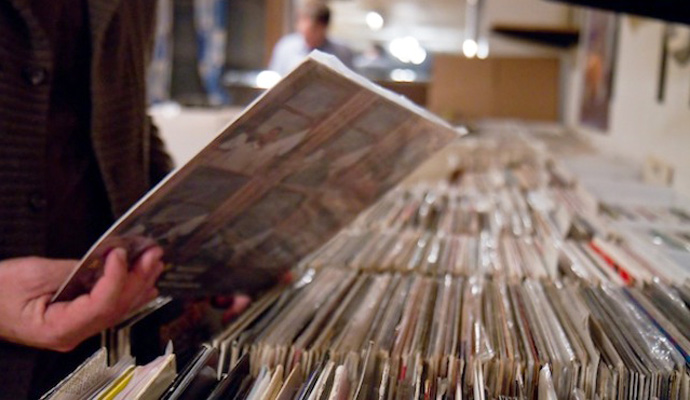Inside the global vinyl trade
By land, air, and sea, earning a profit along the clandestine transatlantic record route

A free daily email with the biggest news stories of the day – and the best features from TheWeek.com
You are now subscribed
Your newsletter sign-up was successful

Ducking into a crumbling and cramped hideout from the imminent downpour, it took only a minute to confirm that, yes, I had found the world's greatest record shop and, no, it wasn't in New York City. My wife Erica and I had encountered Record Station — an unmarked boutique slathered in white paint and framed by tall windows — as we walked along rue des Récollets toward Canal Saint-Martin on an overcast June afternoon in Paris.
The secondhand store, in the city's tenth arrondissement, faces Jardin Villemin, where a military hospital for French troops stood during their war with Prussia. Today, more than 140 years later, peace blankets the neighborhood, where Record Station provides some welcome grit wedged between its posh café and consignment shop neighbors.
(More from Narratively: The unlikely psychic)
The Week
Escape your echo chamber. Get the facts behind the news, plus analysis from multiple perspectives.

Sign up for The Week's Free Newsletters
From our morning news briefing to a weekly Good News Newsletter, get the best of The Week delivered directly to your inbox.
From our morning news briefing to a weekly Good News Newsletter, get the best of The Week delivered directly to your inbox.
Behind its heavy glass door, crates of obscure albums, dog-eared 45s, box-set bootlegs, and "Blaxploitation" DVDs piled around a lanky, blue-eyed 30-year-old named Quentin Devillers. "Bonjour," we announced in our attempt at a customary afternoon greeting, the same one we'd used when entering any fromagerie, boulangerie, or bistro in Paris. "English?" he responded with a tight grin, his jaw wrestling a piece of chewing gum as he punctuated each syllable. Soft-spoken and sporting a crew cut, Devillers opened this shoebox of a shop in December 2009. It dwarfs New York's vinyl stores based on selection rather than space, and with good reason: Devillers gets most of his stuff from places in Manhattan and Brooklyn, and keeps French record fanatics satisfied with a business model that involves closing for days at a time without warning while he shops in the U.S.

"I have, like, two lives," he told me. "My colleagues don't know it."
Just as every disc Devillers sells offers two sides, he, too, has a flipside — one that revolves around working overtime overseas when his supply runs low. That means dropping everything for a last-minute flight to New York, where other buyers from Europe and Asia often unearth rare American and British vinyl they would never find back home. Devillers travels quietly, and says little about his former job with an American airline, a connection that affords him this opportunity every few months.
Once stateside, he rents a Chrysler PT Cruiser — a vehicle big enough to carry boxes of vinyl but compact enough to park anywhere — and drives down the Eastern Seaboard, crashing with friends along the way. He shops during the day, sacrificing sleep as he packs his purchases overnight. During a recent five-day excursion with stops in Pittsburgh, Boston, Baltimore, Washington, and New York, for instance, Devillers amassed about 1,000 albums. He once escaped injury when he nodded off at the wheel and totaled his rental car.
A free daily email with the biggest news stories of the day – and the best features from TheWeek.com
Profit enters the picture upon his return to Paris: Devillers might flip a $10 record he found in Richmond, Va. for 60 euro — roughly $75 — in Paris. If not for international buyers like Devillers hitting the five boroughs by planes, trains, and automobiles, many New York record store owners say their own vinyl businesses would suffer.
(More from Narratively: Dear dusty old bookstore)
Jeff Ogiba, manager of Black Gold Records in Carroll Gardens, Brooklyn, relies on these customers to supplement the waning buying habits of even his most dedicated locals. Japanese collectors account for about one-third of his online orders from outside the country, Ogiba told me, while another 25 percent comes from the United Kingdom.
"I know a few people who actually build skids to ship out there," he said of international vinyl traffic. "It's that big of a trade."

Take Eelco Jorissen, a record shop owner in Amsterdam, who must wait until next year to unload the albums he'll buy from the WFMU Record Fair in Gramercy this weekend. The intrigue behind such a transaction involves not what records Jorissen will buy but how he plans to get them home: A boat will carry 2,000 LPs across the Atlantic to his store, Waxwell Records, where Jorissen stocks about 100,000 hip-hop, disco, and Brazilian titles. He doesn't expect his maritime shipment to arrive until January. And since he visits New York only once a year, everything rides on this vinyl voyage.
"It's sort of a unique selling point to us," Jorissen told me. "It's actually sort of a tiny store, but we have a big basement that's flooded with records."
(More from Narratively: Print ain't dead in NYC)
When Erica and I met Devillers the day before we boarded our seven-hour flight home to New York, he told us that every album he stocks is a transplant from either the U.S. or the U.K.: blues, folk, jazz, reggae, punk, a remarkable collection from soul singer Solomon Burke, and first pressings from '60s American garage bands like The Box Tops, The Standells, and The Seeds. Original pressings here carry high value abroad, even higher depending on the condition of the vinyl and its album sleeve.
"I don't want to have common pieces," Devillers said, pointing to his even pricier finds, like Pink Floyd's "The Piper at the Gates of Dawn," sealed in plastic packaging and pinned to the shop's back wall, out of reach.
"You want to buy something, Hubs?" Erica asked me, knowing I could have easily hauled a few box loads out of there. I've collected ever since I inherited Michael Jackson's "Thriller" from my Nana as a kid and, as of last count, I have 420 records in our 600-square foot Manhattan apartment. (The movers through the years have always hated me for it.) But never before had I paid $75 for an album. And so, for all its charm and choice I walked out of the world's greatest record store empty-handed.
Read the rest of this story at Narratively.
Narratively is an online magazine devoted to original, in-depth and untold stories. Each week, Narratively explores a different theme and publishes just one story a day. It was one of TIME's 50 Best Websites of 2013.
-
 The year’s ‘it’ vegetable is a versatile, economical wonder
The year’s ‘it’ vegetable is a versatile, economical wonderthe week recommends How to think about thinking about cabbage
-
 Moltbook: The AI-only social network
Moltbook: The AI-only social networkFeature Bots interact on Moltbook like humans use Reddit
-
 Judge orders Washington slavery exhibit restored
Judge orders Washington slavery exhibit restoredSpeed Read The Trump administration took down displays about slavery at the President’s House Site in Philadelphia